| Listing 1 - 10 of 16 | << page >> |
Sort by
|
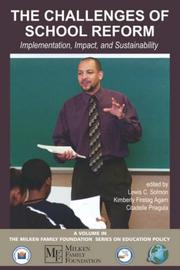
ISBN: 1281387169 9786611387167 1607525631 9781607525639 9781281387165 9781593115197 9781593115203 6611387161 Year: 2006 Publisher: Greenwich, Conn. IAP-Information Age Pub.
Abstract | Keywords | Export | Availability | Bookmark
 Loading...
Loading...Choose an application
- Reference Manager
- EndNote
- RefWorks (Direct export to RefWorks)
School improvement programs --- Educational change --- Educational planning

ISBN: 1280606894 9786610606894 926402364X 9264023631 9789264023642 Year: 2006 Publisher: Paris : OECD,
Abstract | Keywords | Export | Availability | Bookmark
 Loading...
Loading...Choose an application
- Reference Manager
- EndNote
- RefWorks (Direct export to RefWorks)
This volume of the Schooling for Tomorrow series goes beyond the OECD’s own set of educational futures already published. It discusses how to develop scenarios and use them to address the challenges confronting policy and practice. Its chapters give both authoritative scholarly overviews and very practical lessons to be applied, including from Jay Ogilvy, a prominent exponent of scenario thinking for the business world, and school change expert Michael Fullan. This book is relevant for the many – policy makers, school leaders and teachers – concerned with the long-term future of education.
Education and state. --- Education, Primary. --- Educational accountability. --- Educational planning -- United States. --- School management and organization -- United States. --- Education and state --- Education, Special Topics --- Education --- Social Sciences --- Education policy --- Educational policy --- State and education --- Government policy --- Social policy --- Endowment of research
Book
ISBN: 9023242874 Year: 2006 Publisher: Assen Van Gorcum
Abstract | Keywords | Export | Availability | Bookmark
 Loading...
Loading...Choose an application
- Reference Manager
- EndNote
- RefWorks (Direct export to RefWorks)
De auteur start in 1925 bij de eerster leermachines van Sidney Pressey, vervolgt met de teaching machines van Skinner in de jaren '50 en '60 en behandelt daarna het PLATO-systeem uit de jaren '70. Vervolgens bespreekt hij het computerondersteunde onderwijs van de jaren '80, de doorbraak van het internet in de jaren '90 en de vijfvoudige leer-werkmachine, in de vorm van de laptop, van de jaren 0. Bovendien beschrijft de auteur wat er in het onderwijs gebeurde met de fim, radio en televisie en in de huidige tijd met de zoekmachine. Hierdoor ontstaat een goed beeld van de tachtigjarige geschiedenis van de precaire verhouding tussen technologie en onderwijs. (Bron: covertekst)
071406.jpg --- Onderwijstechnologie --- Educational innovations --- Educational technology --- Instructional technology --- Technology in education --- Technology --- Instructional systems --- Teaching --- Education --- Innovations, Educational --- Technological change in education --- Educational planning --- Educational change --- Aids and devices --- Innovations --- Technological innovations --- Experimental methods --- Educational innovations. --- Educational technology.
Book
ISBN: 0820483753 3039109839 Year: 2006 Publisher: Bern ; New York : Lang,
Abstract | Keywords | Export | Availability | Bookmark
 Loading...
Loading...Choose an application
- Reference Manager
- EndNote
- RefWorks (Direct export to RefWorks)
Education --- Educational change. --- Educational sociology. --- Enseignement --- Sociologie de l'éducation --- Philosophy . --- History --- Philosophie --- Réforme --- Histoire --- Sociologie de l'éducation --- Réforme --- Educational change --- Educational sociology --- Education and sociology --- Social problems in education --- Society and education --- Sociology, Educational --- Sociology --- Change, Educational --- Education change --- Education reform --- Educational reform --- Reform, Education --- School reform --- Educational planning --- Educational innovations --- Philosophy --- Aims and objectives --- Philosophy.
Periodical
ISSN: 13059076 1305905X Year: 2006 Publisher: Kyrenia, Cyprus : Academic World Education & Research Center
Abstract | Keywords | Export | Availability | Bookmark
 Loading...
Loading...Choose an application
- Reference Manager
- EndNote
- RefWorks (Direct export to RefWorks)
Education --- Education. --- Cyprus. --- curriculum --- educational technology --- educational planning --- lifelong learning --- mobile learning --- Children --- Education of children --- Education, Primitive --- Human resource development --- Instruction --- Pedagogy --- Schooling --- Students --- Youth --- Civilization --- Learning and scholarship --- Mental discipline --- Schools --- Teaching --- Training --- Chypre --- Ciper --- Cipro --- Cypern --- Kıbrıs --- Kıbrıs Cumhuriyeti --- Kipriaki Dhimokratia --- Kipŭr --- Kypriakē Dēmokratia --- Kypros --- Qubruṣ --- Republic of Cyprus --- Tsiprus --- Zypern --- Qubru --- Chipre --- Kipr --- Ostrov Kipr
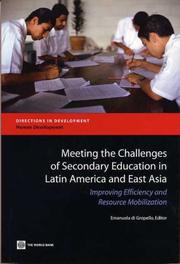
ISBN: 0821366459 0821366467 9780821366455 9786610542598 1280542594 Year: 2006 Publisher: Washington, D.C. : World Bank,
Abstract | Keywords | Export | Availability | Bookmark
 Loading...
Loading...Choose an application
- Reference Manager
- EndNote
- RefWorks (Direct export to RefWorks)
In a context of increased primary school enrollment rates, secondary education is appearing as the next big challenge for Latin American and East Asian countries. This report seeks to undertake a detailed diagnostic of secondary education in these two regions, understand some of the main constraints to the expansion and improvement of secondary education, and suggest policy options to address these constraints, with focus on policies that improve the mobilization and use of resources.
Objectives of teaching --- Secondary education --- East Asia --- Latin America --- Education, Secondary --- Educational change --- Change, Educational --- Education change --- Education reform --- Educational reform --- Reform, Education --- School reform --- Educational planning --- Educational innovations --- Children --- High school education --- High school students --- Secondary schools --- Teenagers --- Education --- High schools --- Education (Secondary)
Multi
ISBN: 9085045894 9086860176 9789086860173 9086865895 Year: 2006 Publisher: Wageningen Wageningen Academic Publishers
Abstract | Keywords | Export | Availability | Bookmark
 Loading...
Loading...Choose an application
- Reference Manager
- EndNote
- RefWorks (Direct export to RefWorks)
Theses --- Higher education --- anno 2000-2099 --- Sub-Saharan Africa --- Education, Higher --- Educational innovations --- Agricultural education --- Universities and colleges --- Research --- Technological innovations --- Colleges --- Degree-granting institutions --- Higher education institutions --- Higher education providers --- Institutions of higher education --- Postsecondary institutions --- Public institutions --- Schools --- Education, Agricultural --- Technical education --- Education --- Innovations, Educational --- Technological change in education --- Educational planning --- Educational change --- Educational technology --- Innovations --- Experimental methods
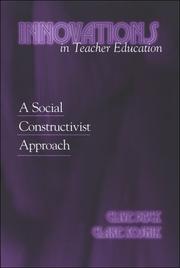
ISBN: 0791481840 142377292X 9781423772927 9780791481844 0791467171 079146718X 9780791467183 9780791467176 Year: 2006 Publisher: Albany : State University of New York Press,
Abstract | Keywords | Export | Availability | Bookmark
 Loading...
Loading...Choose an application
- Reference Manager
- EndNote
- RefWorks (Direct export to RefWorks)
This book offers a comprehensive, "social constructivist" approach to preservice education. Written in a clear, accessible style, it presents key principles of teacher education and concrete examples from eight successful programs in Australia, Canada, and the United States. It extends constructivism beyond Piaget and Vygotsky to more recent theorists such as Barthes and Derrida, indicating how such an approach can lead to engaging, effective education. Clive Beck and Clare Kosnik advocate an approach to teacher education that is highly original, linking integration, community components, and inquiry to a degree not commonly found in preservice programs, and they show in detail how to implement these elements.
Educational innovations. --- Constructivism (Education) --- Teachers --- Student teachers. --- Education --- Innovations, Educational --- Technological change in education --- Educational planning --- Educational change --- Educational technology --- Cognitive-developmental theory --- Constructionism (Education) --- Constructivist education --- Piagetian theory of cognitive development --- Learning, Psychology of --- Teacher education --- Teacher training --- Teachers, Training of --- Preservice teachers --- Training of. --- Innovations --- Technological innovations --- Experimental methods
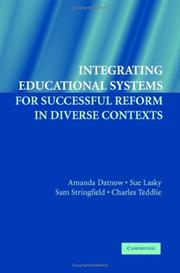
ISBN: 9780511499906 9780521857567 9780521674348 0511499906 0511246099 9780511246098 9780511246784 0511246781 0511244630 9780511244636 0511245386 9780511245381 0511243138 9780511243134 0511250983 9780511250989 0521857562 9786610702596 6610702594 0521674344 0521674344 0521857562 1107166764 9781107166769 1280702591 9781280702594 0511318758 9780511318757 Year: 2006 Publisher: Cambridge Cambridge University Press
Abstract | Keywords | Export | Availability | Bookmark
 Loading...
Loading...Choose an application
- Reference Manager
- EndNote
- RefWorks (Direct export to RefWorks)
Linguistic, ethnic, and economic diversity is a major factor influencing how school reform ought to be accomplished at local, state, and government levels. This book examines the issue of successful school reform in diverse communities. It is the first to synthesize research on educational research on educational reform pertaining to racially and linguistically diverse students. It examines what is needed at the teacher, school, district, state, and federal levels for educational reform to be successful in multicultural, multilingual settings. Conclusions are based on a careful review of hundreds of recent quantitative and qualitative studies relating to educational reform in diverse communities. The authors conceptualize education as an interconnected and interdependent policy system and discuss the key policy, relational, political, and resource linkages that assist in achieving sustainable improvement in schools serving at-risk students.
School improvement programs --- Educational change --- Multicultural education --- Intercultural education --- Education --- Culturally relevant pedagogy --- Change, Educational --- Education change --- Education reform --- Educational reform --- Reform, Education --- School reform --- Educational planning --- Educational innovations --- Improvement programs, School --- Instructional improvement programs --- Programs, School improvement --- School self-improvement programs --- School management and organization --- Culturally sustaining pedagogy --- Health Sciences --- Psychiatry & Psychology
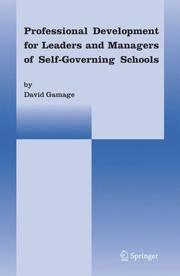
ISBN: 1280611774 9786610611775 1402049293 1402049285 9048172292 Year: 2006 Publisher: Boston : Kluwer,
Abstract | Keywords | Export | Availability | Bookmark
 Loading...
Loading...Choose an application
- Reference Manager
- EndNote
- RefWorks (Direct export to RefWorks)
Today, the self-governing schools (SGS) have become a global phenomenon. It has liberated school heads from the bureaucratic shackles, making them leaders in their own right. Accordingly, the principal’s role has undergone the most radical transformation and has been widely acknowledged as the vanguard of stability and the agent of change in creating effective schools. As the CEO, the principal has to develop a shared vision with the capacity to incorporate diverse leadership styles such as Transformational, Distributed, Shared and Strategic. Under the SGS model the governing body formulates school policies in consultation with the principal, making him/her responsible and accountable for implementation. However, to face the new challenges posed by the SGS model (otherwise known as Site-based/School-based management (SBM) and Local management of schools (LMS)), it has become imperative that school leaders undergo further professional development in leadership and management. This is evidenced by recent research conducted in countries such as the USA, China, Australia, Japan, Sweden, Thailand and the Philippines. This book is the culmination of the author’s 34 years of research, administrative and academic experience in guiding, educating and training both aspiring and practicing educational/school leaders from around the world. It is a cutting edge response to the widely acknowledged need for further professional development in school leadership.
School management and organization. --- Career development. --- Educational administration --- Inspection of schools --- School administration --- School inspection --- School operation policies --- School organization --- Schools --- Educational planning --- Management --- Inspection --- Management and organization --- Career advancement --- Career ladder --- Career management --- Career planning --- Development, Career --- Development, Professional --- Employee development --- Organizational career development --- Professional development --- Personnel management --- Vocational guidance --- Management. --- Administration, Organization and Leadership. --- Administration --- Industrial relations --- Organization --- School administration. --- Administration, Educational --- Operation policies, School --- Policies, School operation --- Education
| Listing 1 - 10 of 16 | << page >> |
Sort by
|

 Search
Search Feedback
Feedback About UniCat
About UniCat  Help
Help News
News